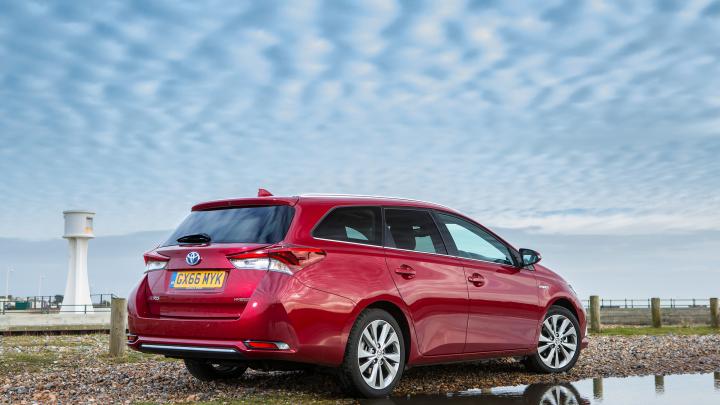


As one of the pioneers of petrol hybrid-powered family cars, Toyota now offers hybrid versions of the Yaris supermini, the Toyota C-HR SUV and the Toyota Auris, as well as the famous Toyota Prius that got the Japanese company’s hybrid ball rolling.
Buyers of hybrid-powered family hatchbacks aren’t exactly spoilt for choice. The Hyundai Ioniq Hybrid is more of a direct rival for the Prius, while the Kia Niro is a compact SUV that most closely corresponds with the C-HR. Buyers are more likely compare the Auris Hybrid against the most fuel-efficient petrol and diesel versions of the Ford Focus, Vauxhall Astra, Kia Cee’d and Hyundai i30.

A 1.8-litre petrol with a CVT gearbox is the only engine option and it’s shared with the aforementioned Prius. On the face of it, excellent claimed economy is one of the major aspects of the Auris that set it apart from its rivals – Toyota suggests 80mpg is possible, although drivers who make frequent long, fast journeys are likely to experience fuel economy closer to a conventional petrol or diesel car.
The Auris has low claimed CO2 emissions, too, and this means it stacks up well as a company car – the Benefit-in-Kind (BiK) bracket is lower than for the petrol or diesel model and compares well against rival hatchbacks and small estates.
Company-car users, who enjoy the no-nonsense nature of the car and no doubt appreciate its reputation for reliability. The latter is something that private owners can take reassurance from, too – as is the extensive standard safety equipment that most models boast.Image 5 of18
If there’s one thing missing from the Auris hatchback and Touring Sports, it’s flair. In its design and the way it feels from behind the wheel, Toyota’s dependable family car does little to tug at the heartstrings. Rivals from Europe and Japan may not match the economy claims of the Auris Hybrid, but do rather more to arouse passion elsewhere.
However, for many the five-year/100,000-mile warranty, robust engineering and generous standard equipment make the Auris Hybrid a winner.
Unlike some versions of the Prius, though, these models don’t offer a plug-in feature – the hybrid battery is filled as the car drives along and all-electric range is limited. It’s enough, though, to bring claimed CO2 emissions and fuel consumption to a level far superior to conventional petrol models in the range.